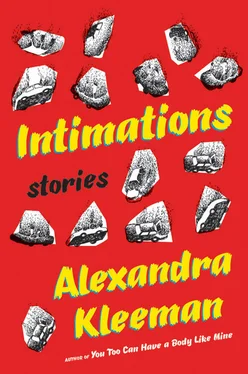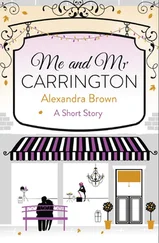
Was the disappearing growing faster every day? No. Was it moving geographically from west to east, or east to west? Was it vanishing the world alphabetically, taxonomically, or in chronological order? It wasn’t. As hard as we tried to understand it, there didn’t seem to be much order to the disappearing at all. A week would go by with everything pretty much in its proper place, and then all of a sudden there was no such thing as magazines, not in your home or anyone else’s, and nobody to bother making new ones. Did it work its way down from the biggest things to the smallest? Was there a plan? When you were in the right mood, when you were too tired to care much, it was beautiful — like watching the house across the street as someone walked through it turning each of the lights off in order, one by one, for the night.
I sat on the floor of my brother’s empty living room and ate four chocolate chip granola bars in a row. I had already called you once today, but I was working on a reason to call you again. Experts suggested that the things disappearing most quickly now might be intangible, metaphysical: concepts, memories, and modes of thought were just as vulnerable to erasure, they said, though they couldn’t give any concrete examples. I thought I’d better call you to see if you still remembered that Cookie had gone.
I pushed the buttons in order. It rang twice, and then I heard you.
Hello? you said.
It’s me, I said.
It’s you, you said back to me.
I just wanted to call to see if you still remembered Cookie, I said.
Of course I still remember Cookie, you said.
There was silence on both our ends, a blur of static on the line between us.
What do you remember? I asked.
I remember that you picked her because she bit you, you said, and you decided it was important that you win this one animal over. I remember you didn’t know how to hold a cat at the beginning, so you grabbed her just anywhere. You grabbed her in the middle and tried to pick her up that way. You got bit a lot, you added.
I have your number memorized, I said.
That’s good, you said.
And I said I should let you go, and you said good night and we hung up on each other.
I missed you more now than I had when I lost you. I was forgetting the bad things faster than I forgot the good, and the changing ratio felt a little bit like falling in love even though I was actually speaking to you less and less. I used to play a game I called “Are We Going to Make It?” You were playing too, whether you knew it or not. It worked like this: you’d forget that we were going to see the movie together and you’d go by yourself instead or with a friend, while I waited at home. Or you’d stay at work until four in the morning and forget to charge your phone, and you’d wake me up on the couch where I had fallen asleep trying to stay up for you. Then I would ask myself: Are We Going to Make It? And the next thing, whatever thing you did next, would become the answer, a murky thing that I’d study until I was too tired to think about it anymore.
An “independent physicist” living in Arizona had become famous for his theories on how the Disappearing might be a sort of existential illusion, analogous to an optical illusion. He said the fact that we still remember what’s been taken and can picture it in our minds is proof that it still exists. It’s like how you only see the duck or the bunny at a given moment, never both, he said. Only imagine that instead of knowing the bunny exists alongside your experience of the duck, you believe that it’s been irrevocably lost. It’s all about vantage point, he said, temporal vantage point: the way you might lose sight of your house when you drive away from it, but find it again when you look for it from the top of a hill. To think your house was lost, he said, would be loony. Disappeared things were like this, he said, coexistent but obscured in time. This was his theory of spatiotemporal obstruction. Those who believed in it believed that there was one special place that offered temporal “higher ground.” They made pilgrimages to a particular beach in Normandy where the cliffs were chalky white, the color of doves, and where it was rumored that recently disappeared things sometimes reappeared, soft-edged and worn and looking thirty or forty years older. In 1759 a twelve-year-old girl was said to have drowned herself there to avoid marriage to a much older man.
I sat on the floor and put the granola bar wrappers in a plastic bag. I put the plastic bag inside another plastic bag. Plastic bags were disappearing too, but my brother had had so many of them to begin with. Then I picked up the phone to call you back. I put your number in from memory.
Instead of you, I heard an error song and a recorded voice telling me my call could not be completed.
I dialed the Bureau of Disappearances. At the prompt, I pressed 1 for “person,” then 1 again for “male.” I pressed 3 to indicate “age twenty-one to thirty.” Then I was supposed to press 3 for “friend,” but instead I pressed 2 for “lover or significant other.” I hoped you wouldn’t mind. The beautiful female voice declared you a “male lover between the ages of twenty-one and thirty” and asked if that was correct. I pressed the pound key and then I described you.

I remember it was a bright morning in the fall and I woke onto your face looking in on mine. Some mornings when we woke together we pretended that one of us had forgotten who the other was. One of us had become an amnesiac. That one would ask: Who are you? Where am I? and it was the other’s job to make up a new story. A good story was long, and the best stories could make me feel like I had gotten a whole second life, a bonus one. Yellow leaves outside the window threw yellowish light on the sheets as you told me not to worry. I was safe, I was with you. We had been living together since grad school; we met on the hottest day of the year, near the gondolas in the middle of the park. We were sitting on benches facing the pond and eating the same kind of sandwich, turkey and swiss in a spinach wrap.
But that’s what actually happened, I said.
I know, you said, making a fake guilty face.
In the fall afternoon, leaves fell off whenever they fell off: it didn’t depend on their color or weight or the force of the wind outdoors.
You added: I just couldn’t think of anything.
The disappearing when it started happening was everywhere, subtly, it hung on our days the way a specific hour does on a moment, dragging it down and reminding you of how much time you’ve let pass. It was a flavor you woke up with in your mouth, like the taste of blood on a dry winter morning. This made leaving easier in the moments before I had realized what I was planning to do. I stood outside our building with no keys, and I was calling you over and over on the cell phone even though I knew you were at work. Each time I got your voice mail I imagined that you had vanished, until one time I imagined that you had vanished and I didn’t feel any way about it. It was like I had disappeared. I saw the things continuing on without me, and I didn’t mind. I went to the ATM on the corner and pulled everything out of my checking account. Checking accounts were still around then, existing invisibly somewhere. Possibly they exist still, even though the banks went. I took the cash and our car and got on the highway, driving on I-80 west toward Chicago. If it hadn’t been the End of Days, would we still be together? The most difficult thing about leaving you was discovering that I went on: that I had to be there sixteen hours a day watching myself live my own life, that I had to stay near myself all the time as I asked myself question after question, that I had to sit there in my body and watch the phone ring over and over next to me that night, after you had gotten home.
Читать дальше













